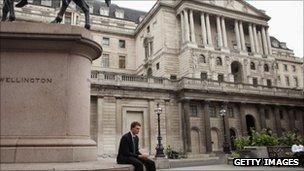Cameron: No change to UK debt crisis plan
- Published
David Cameron speaking to ABC News: "This is a debt crisis, not a traditional cyclical recession"
The government will not change tack in its efforts to reduce the budget deficit despite the lack of UK economic growth, the prime minister has said.
The International Monetary Fund has cut its UK growth forecast and cumulative public sector net borrowing is put at £52bn - only 7% less than a year ago.
As the eurozone crisis deepened, David Cameron insisted to ABC News that Britain was not in trouble.
But Labour leader Ed Miliband said the government needed to "change course".
No 'money taps'
Speaking in the US, David Cameron said the government was dealing with "a debt crisis... not a traditional cyclical recession where you just turn on the money taps".
He said: "You have got to deal with the debts and pay for your debts as well as having a very strong growth strategy."
Public sector net borrowing was a higher-than-expected £15.9bn in August and inflation has now risen to 4.5%
Last week the Treasury denied it was discussing how to inject up to £5bn into the economy without abandoning its deficit reduction strategy.
Mr Cameron said there would be no changes to the government's austerity measures.
"We have to deliver on the programme, that is vitally important to prove to the world we can pay our way and to keep our interest rates," he said.
The Bank of England's monetary policy committee has agreed to keep interest rates unchanged at 0.5%, which the prime minister welcomed.
"We have interest rates at the same level as Germany - down to 2%," he said.
As the eurozone crisis worsened still this week, there was more volatility on the world's share markets, including the UK's.

The UK's FTSE 100 fell 3.6% last week, as storm clouds gathered over the UK economy
The UK's FTSE 100 fell 3.6% over the week, France's Cac 40 shed 4.4% and in the US the Dow Jones dropped 6.4%, its biggest weekly fall since October 2008.
But Mr Cameron said that although other countries in the eurozone were struggling to deal with their deficits, the UK was not.
"We have a deficit sadly which is, as I say, the same size as Greece and Spain and Portugal - the ones that are in trouble.
"We are not in trouble because we have actually shown the world we have a plan to deal with this."
Chancellor George Osborne said earlier this month: "We will stick to the deficit reduction plan we have set out. It is the rock of stability on which our economy is built."
'Dangerous phase'
But Mr Miliband called on David Cameron to "show some leadership" and get Britain's economy growing again.
Speaking to Andrew Marr ahead of the Labour party conference, Mr Miliband said moves like a reduction in VAT were needed to do so: "If I was the prime minister, we would be having to make cuts.
"We would meet the plan of halving the deficit over four years.

Some analysts believe quantitative easing could re-start in the UK in November
"But there's three ways that you meet a plan on the deficit: tax rises, which have already been done by the government, spending cuts, but growth.
"Growth is the absolute missing ingredient we have."
Meanwhile some analysts believe that quantitative easing could re-start in the UK in November, as the Bank of England moves to inject more money into the faltering UK economy.
Leader of the Liberal Democrats and deputy prime minister Nick Clegg said this week there was a "long hard road ahead".
But he said: "We were right to pull the economy back from the brink. It is clearer now than ever that deficit reduction was essential to protect the economy."
The IMF has said it will take decisive action to tackle the eurozone debt crisis but Mr Osborne said allowing Greece to default on its debts was not a proposal that was put forward.
Greece has been awarded bail-outs to the tune of 219bn euros to try and stabilise its economy.
After IMF talks, Mr Osborne said: "I think there is a recognition here that the debt crisis has reached a dangerous phase.
"But we are optimistic that we have taken a step towards resolving it."